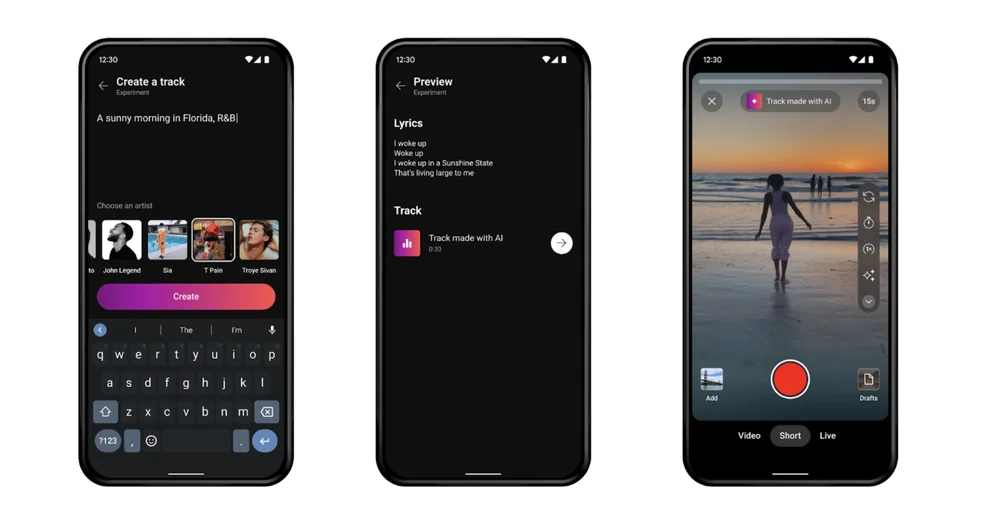 AI
AI
 AI
AI
 AI
AI
The creators of YouTube Shorts, very short video content on Google LLC’s video platform, can soon use tools powered by generative artificial intelligence to create music for their videos using the style of various famous artists.
YouTube partnered with Google DeepMind, the company’s AI research laboratory, to use the advanced AI model Lyria to create the musical experiment Dream Track for Shorts. The company also unveiled an upcoming set of music AI tools, which Google says will help creators produce music in new ways.
Powering the whole experimental process is a new generative AI model for music created by DeepMind called Lyria. According to the research lab, Lyria is built to be superlative at generating music that includes instrumentals and vocals. It can also listen to and continue a piece that has already been produced.
“Music contains huge amounts of information — consider every beat, note, and vocal harmony in every second,” Google said in the announcement, noting where Lyria is designed to excel. “When generating long sequences of sound, it’s difficult for AI models to maintain musical continuity across phrases, verses, or extended passages.”
The initial trial of Lyria will be for Shorts, which are a maximum of 60 seconds long, making it a staging ground for AI-produced music, although the experiment only produces a 30-second soundtrack. With the experiment, a limited set of users will gain access to the generative AI model, which will allow them to type in a text prompt of what type of music they want and it will produce a soundtrack, including harmony, melody and vocals, for their video.
Joining the experiment, a number of famous musical artists lent their musical styles and voices to DeepMind, including John Legend, Sia, Charli XCX, Louis Bell and T-Pain. Users merely need to pick the artists that they want their AI-generated soundtrack to sound like and input their prompt and it will generate sound appropriate to genre and style.
“When I was first approached by YouTube, I was cautious and still am, AI is going to transform the world and the music industry in ways we do not yet fully understand,” said Chari XCX, whose song “Speed Drive” was featured in blockbuster “Barbie” movie. “This experiment will offer a small insight into the creative opportunities that could be possible and I’m interested to see what comes out of it.”
Google also previewed AI Music Tools, a set of experimental tools that it will roll out in the coming months to creators to assist with their creative process use Lyria that are powered only by the limits of their imagination.
In a demonstration, Google revealed how Lyria could be used to take a hummed or sang section of music and transform it into an instrumental horn line. The same could be done with another segment of music produced by a MIDI keyboard, or another instrument, by changing it into a realistic choir, or using the model to match instrumental accompaniment to a vocal track.
According to the company, Lyria-powered music tools could be used to create entire new music segments or instrumentals from scratch, transform audio from one style or instrument to another. Artists who wanted to completely change their presentation and style overnight could choose to go from folk music to heavy metal to see what that would do to their music.
The same team also revealed that content published by the Lyria model is watermarked by a system called SynthID. DeepMind built SynthID as a tool that embeds an invisible trace in images generated by Google’s Imagen image generating AI model in Vertex AI, the company’s platform for building AI, so that users can identify artwork produced by it. Using SynthID, users can check if a musical track was produced by Lyria.
This news comes at a tumultuous time for entertainment relations with AI. Universal Music Group sued AI startup Anthropic in October for copyright infringement, claiming its chatbot Claude scraped its clients’ song lyrics to train its systems, allowing it to reproduce them outright and generate song lyrics and poems in the same style as artists.
One reason for the strike by the Screen Actors Guild – American Federation of Television and Radio Artists, which ended earlier this month, involved the use of AI. One of the major wins of the tentative deal added AI guardrails providing that film and TV producers must obtain consent from actors to use their likenesses and provide compensation for the use of generative AI replicas.
Support our mission to keep content open and free by engaging with theCUBE community. Join theCUBE’s Alumni Trust Network, where technology leaders connect, share intelligence and create opportunities.
Founded by tech visionaries John Furrier and Dave Vellante, SiliconANGLE Media has built a dynamic ecosystem of industry-leading digital media brands that reach 15+ million elite tech professionals. Our new proprietary theCUBE AI Video Cloud is breaking ground in audience interaction, leveraging theCUBEai.com neural network to help technology companies make data-driven decisions and stay at the forefront of industry conversations.